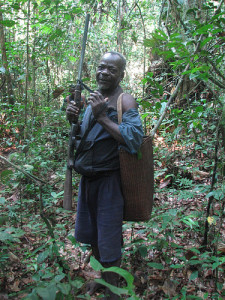Láyé àtijọ́, iṣẹ́ Ọdẹ jẹ ikan ninú iṣẹ gidi ni ile Yorùbá. Ògbójú Ọdẹ ló npa ẹranko bi Erin, Ẹkùn, Kìnìún àti Ẹfòn, Ìmàdò, Ikõkò, nígbàtí àwọn to nṣe Ọdẹ etílé npa ẹranko ìtòsí ilé bi Ọ̀kẹ́rẹ́, Òkété, Ọ̀bọ àti bẹ̃bẹ lọ. Ẹran ìgbẹ bi Ìgalà, Àgbọ̀nrín àti , ẹran ọ̀sìn bi Àgùntàn, Ewurẹ, Òbúkọ, Ẹlẹ́dẹ̀ jẹ ẹran tí o wọ́pọ̀ fún jíjẹ ni ayé àtijọ dípò ẹran Mãlu tí ó wá wọpọ láyé òde òní.
Àwọn ẹranko bi Ẹfọ̀n, Erin, Kìnìún, Ẹkùn ti dínkù nígbàtí ẹranko bi Àgbánreré ti parẹ́ ni ilẹ̀ Yorùbá.
A lè fi ò̀we Yorùbá “Bi Ọdẹ bá ro ìṣẹ́ ro ìyà inú igbó, ti ó bá pa ẹran kòní fẹ́nì kan jẹ” wé ìyá ti àwọn ti ó wà ni Ìlúọba/Ò̀kèòkun njẹ nínú òtútù lati pa owó. Nínú owó yi, wọn a ronú àti ran àwọn ẹbí àti ọ̀rẹ́ lọ́wọ́, ṣùgbọ́n ọ̀pọ̀lọpọ̀ àwọn ti wọn gbìyànjú lati ràn lọ́wọ́, ki i wo ìya ti ojú wọn rí.
Ẹ rántí wípé ẹni ti o bá laanu ló lè ronú lati ran ẹlòmíràn lọ́wọ́.
ENGLISH TRANSLATIONIn time past, hunting was one of the major livelihoods in Yoruba land. Only highly skilled hunters killed animals like elephants, leopards, lions and buffalo while the neighbourhood hunters hunted for animals closer to home like squirrels, bush rats, monkeys etc. Bush meat such as deer stag, deer and the domestic animals like sheep, goats, he-goat, pigs were common sources of meat in those days rather than Cow meat which is common now a days.
Of course such hunting with modern weapons has led to a great reduction in animals such as buffalo, elephants, lions, leopards, while some animals like the rhinoceros have become altogether extinct in Yoruba land. this a good reason why hunting is not exactly still a major livelihood in Yoruba land as it used to be. Of course, it is conceivable, that the modern counterpart of hunting wild game, is the Yoruba person that leaves home for far away places, akin to a wilderness of sorts (the unknown), in search of British pounds & US dollars.
The literal meaning of this Yoruba proverb: “If the hunter thinks of the suffering in the wild, when he makes a kill, he would not share with anyone” can be applied to those living in the United Kingdom and other parts of the world, who have to earn a living in cold climates & strange cultures. While they think of sending such hard earned money home to help parents and friends, those receiving such help never think of the suffering they have gone through.
We should remember that it takes a very kind person to deny themselves or face the wilderness in order to help others.
Originally posted 2015-10-23 10:15:07. Republished by Blog Post Promoter



